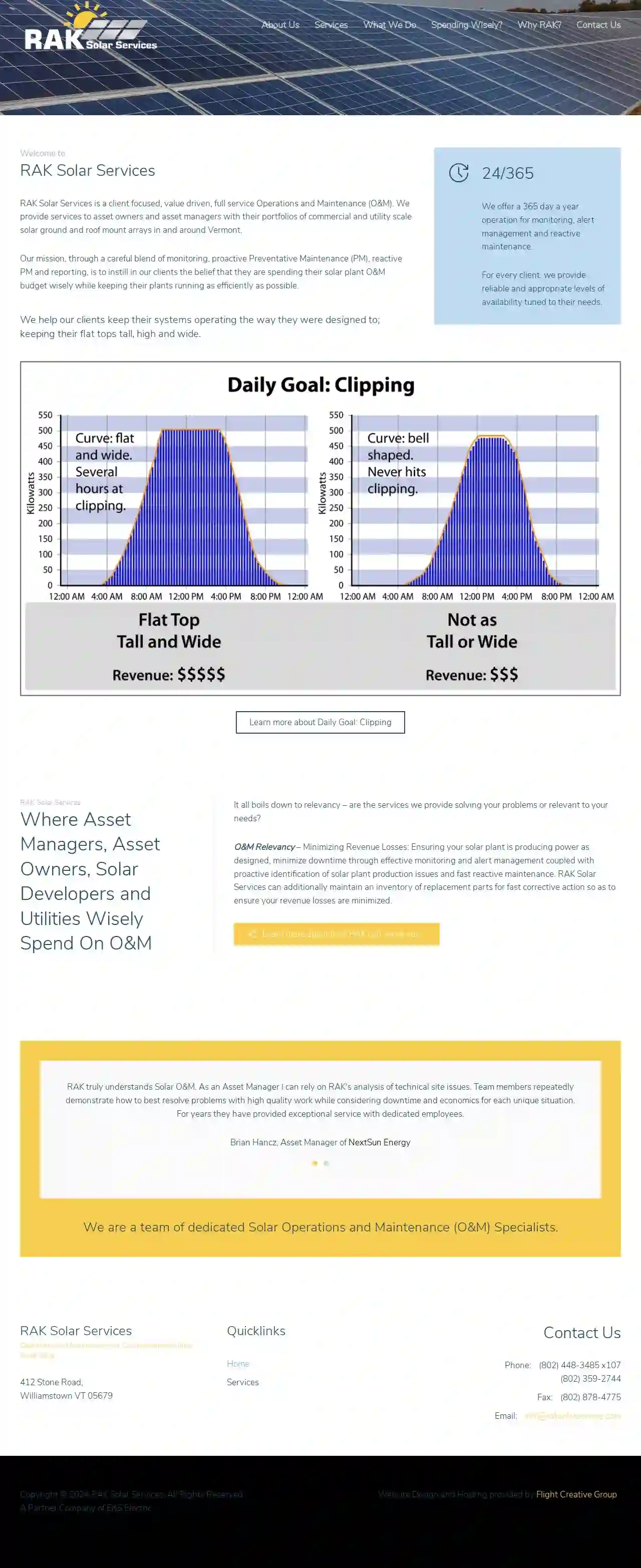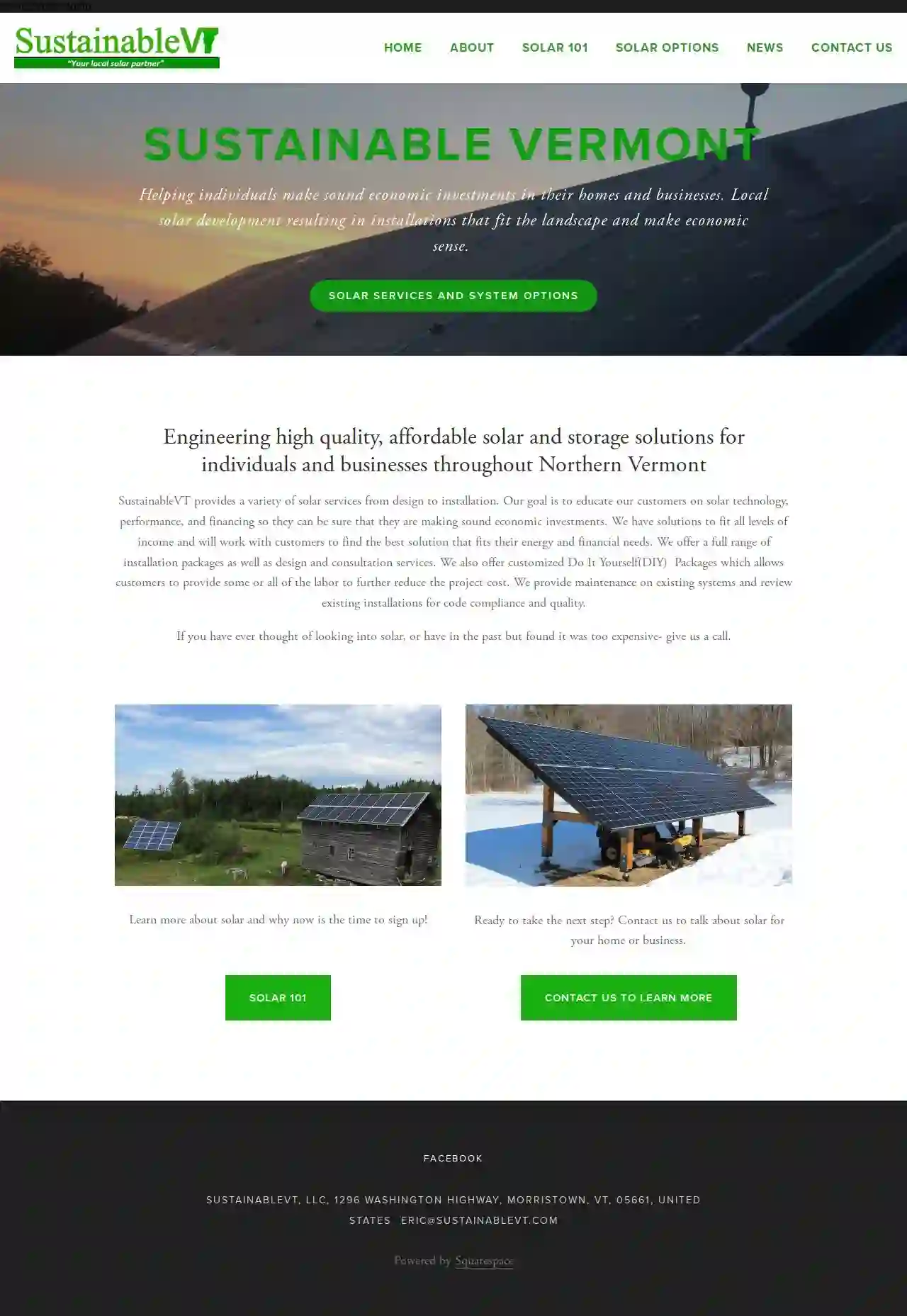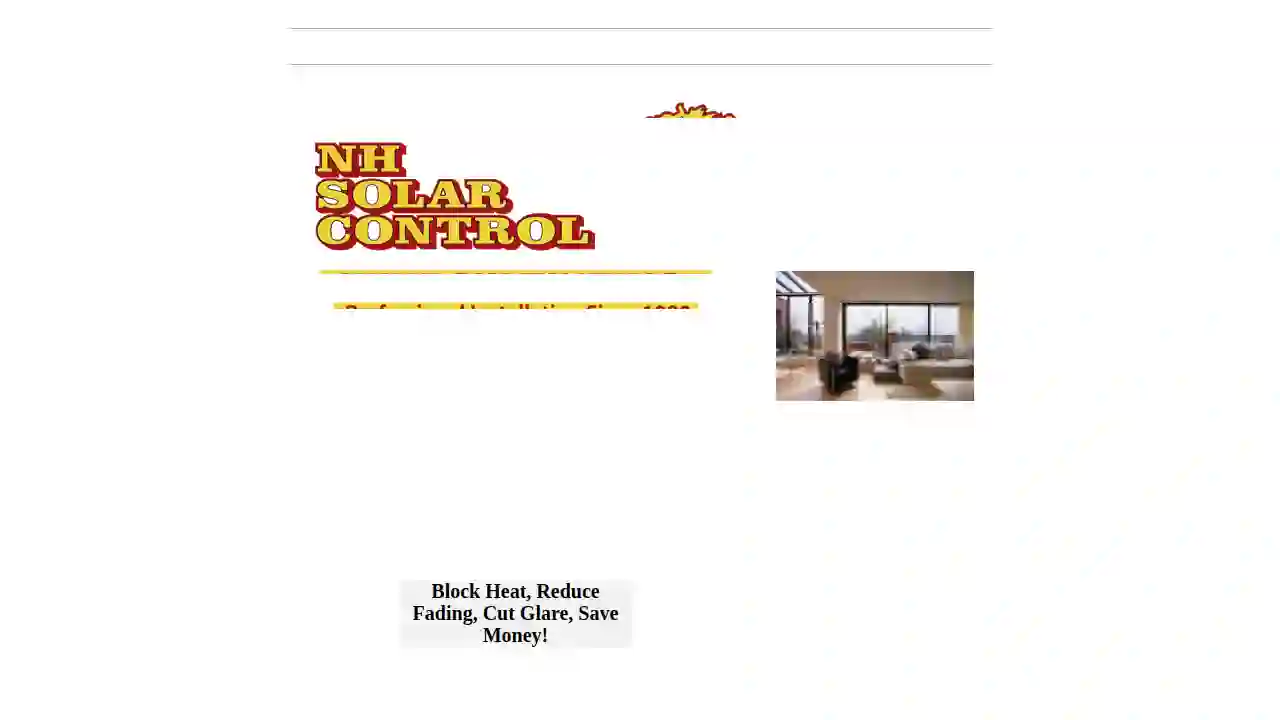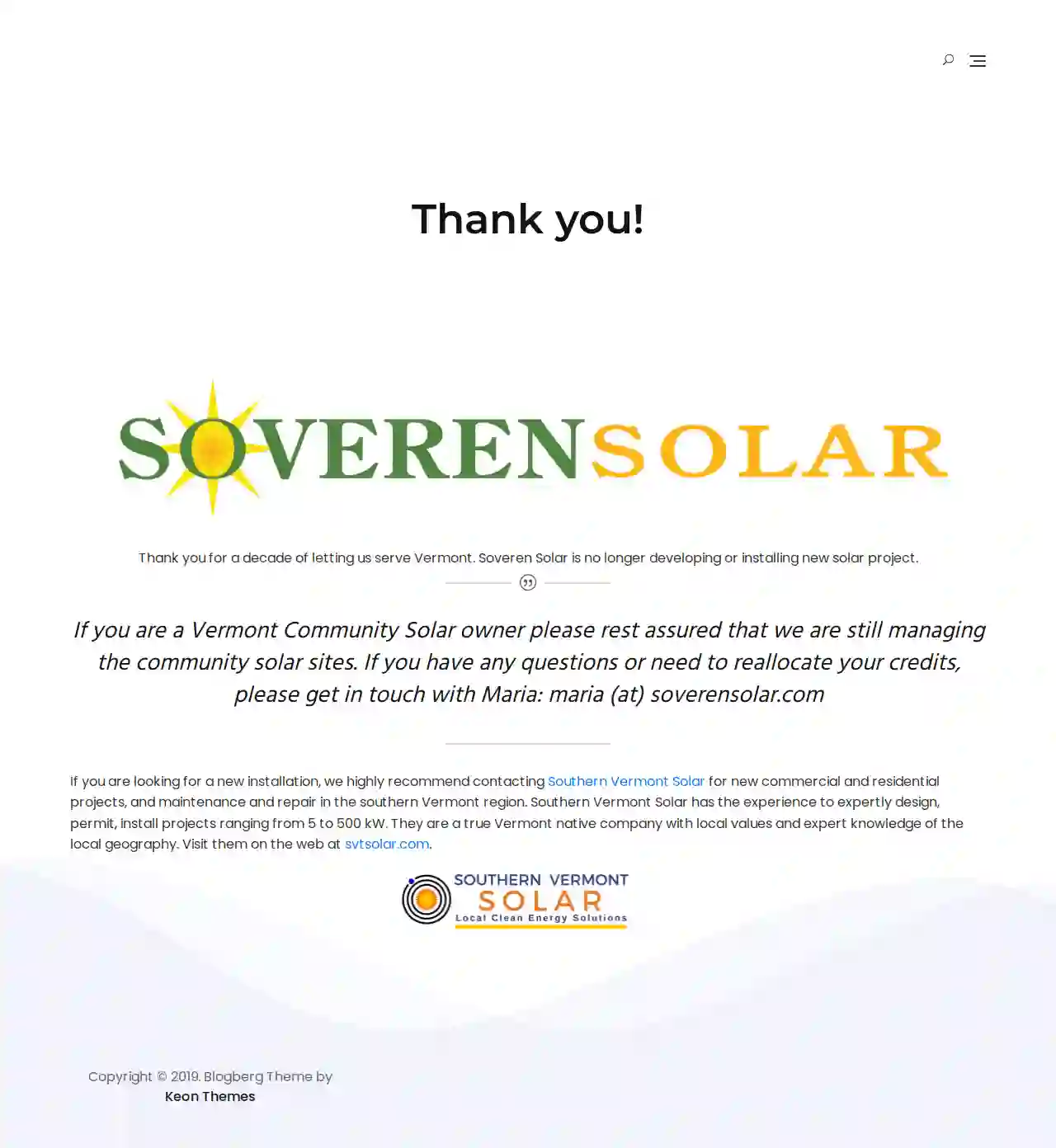Solar Installers Putnam
Top Residential Solar Installers in Putnam
Get 3 FREE Solar Companies quotes for your project today! Compare profiles, reviews, accreditations, portfolio, etc... and choose the best service.

RAK Solar Services
41 reviewsWilliamstown, VT, 412 Stone Road, 05679, USRAK Solar Services is a client-focused, value-driven, full-service Operations and Maintenance (O&M) company. They provide services to asset owners and asset managers with their portfolios of commercial and utility-scale solar ground and roof mount arrays in and around Vermont. Their mission is to instill in their clients the belief that they are spending their solar plant O&M budget wisely while keeping their plants running as efficiently as possible.
- Services
- Why Us?
- Accreditations
- Our Team
- Testimonials
- Gallery
Get Quote
Granite State Solar
4.8162 reviews57 Ryan Road, Bow, NH, 03304, USGranite State Solar is a residential and commercial solar and backup energy solution provider. We make energy projects simple through every step, from the initial site visit and system design, to the project management, permitting and installation, all the way to post-install maintenance. Our team takes an educational and no-pressure sales approach, and always puts our customers first. With our full team based in Bow, NH, our doors are always open!
- Services
- Why Us?
- Accreditations
- Gallery
Get Quote
Valiant Energy Solutions
4.3332 reviews165 RAILROAD HILL ST., WATERBURY, CT, 06708, USValiant Energy Solutions is a trusted energy solutions partner for home comfort and efficiency. They specialize in helping homeowners optimize their energy systems to reduce monthly energy bills and put money back in their pockets. They offer a wide range of innovative and cutting-edge solutions for homes and businesses alike, including fuel delivery services, heating, cooling, home efficiency, electrical, plumbing, and renewables.
- Services
- Why Us?
- Accreditations
- Our Team
- Testimonials
- Gallery
Get Quote
GoSolar New England
Suite 101, Concord, NH, 123 Solar Way, 03103, USGo Solar NH is a leading provider of solar energy solutions in New Hampshire. Our mission is to help homeowners and businesses reduce their energy costs and carbon footprint by harnessing the power of the sun. With over 15 years of experience in the solar industry, our team of experts is dedicated to delivering high-quality solar installations and exceptional customer service. We are fully accredited and insured, ensuring peace of mind for our clients. Our services include solar panel installation, solar battery storage, and solar panel maintenance.
- Services
- Why Us?
- Accreditations
- Our Team
- Testimonials
Get Quote
SustainableVT
Hyde Park, VT, United States, 320 Bornemann Rd, 05661, USSustainableVT is a local business that specializes in solar energy solutions for individuals and businesses in northern Vermont. The company is owned and operated by Eric and Alec Bornemann, who have over 20 combined years of engineering experience in the solar industry. Their mission is to foster a sustainable future for Vermont homeowners, businesses, and communities through energy independence and economic vitality. SustainableVT offers a variety of solar services from design to installation, including residential and commercial solar, do-it-yourself packages, off-grid systems, consulting, and engineering. They also provide maintenance on existing systems and review existing installations for code compliance and quality.
- Services
- Why Us?
- Accreditations
- Our Team
- Gallery
Get Quote
N H Solar Control
51 reviews123 Solar Way, Beverly Hills, CA, 90210, USNHSolarControl is a leading provider of solar control window films, offering a wide range of solutions to enhance energy efficiency and comfort in homes and offices. With a commitment to quality and customer satisfaction, they offer a variety of products and services designed to meet the specific needs of their clients.
- Services
- Why Us?
- Accreditations
- Our Team
- Testimonials
Get Quote
Trio Solar
4.918 reviews69 Fairview Ave, Enfield, CT, 06082, USTrio Solar Power was founded on the idea that there is a better way to get solar. Not just different. Better. Founded by three friends with almost 30 years of combined experience in the solar industry, they are enthusiastic about solar energy and tired of seeing many companies exploiting uninformed customers. They have a small group of skilled professionals and a robust network of excellent partners and pride themselves in finding the very best solar solution to meet your home and families needs.
- Services
- Why Us?
- Accreditations
- Gallery
Get Quote
SunRun Solar
32 reviewsSan Francisco, CA, 77 Beale Street, 94103, USSunrun is the #1 home solar and battery company in America, providing innovative products and tailored plans to help customers take control of their energy bills. With over 900,000 homes and counting, Sunrun offers a comprehensive repairs, maintenance, and monitoring program, ensuring hassle-free solar experiences.
- Services
- Why Us?
- Accreditations
- Our Team
- Testimonials
- Gallery
Get Quote
Solar Energy US Inc.
Stamford, CT, US, 25 Deming Lane, 06903Solar Energy US Inc is a leading provider of renewable energy solutions, focusing on reducing carbon footprint and promoting sustainable energy. Our mission is to innovate, integrate, and implement sustainable energy solutions globally. We offer a range of services including project planning, geospatial mapping, and microgrid management. Our team comprises experienced professionals dedicated to achieving our mission.
- Services
- Why Us?
- Accreditations
- Our Team
- Testimonials
- Gallery
Get Quote
Soveren Solar
123 Solar Street, Burlington, 05401, USSoveren Solar is a Vermont-based solar installation company that has been serving the community for over a decade. They specialize in developing and installing solar projects, and their team is dedicated to providing high-quality service and sustainable energy solutions. Although they are no longer developing or installing new solar projects, they continue to manage community solar sites and offer support to existing clients.
- Services
- Why Us?
- Accreditations
- Our Team
- Testimonials
- Gallery
Get Quote
Over 4,210+ Solar Installers registered
Our solar installers operate in Putnam and surrounding areas!
SolarCompaniesHub has curated and vetted Top Solar Installers in Putnam. Find a top & trustworthy pro today.
Frequently Asked Questions About Solar Installers
- String Inverters: Connect multiple panels in a series (a 'string'). A cost-effective option for simple systems, but a single panel issue can affect the entire string.
- Microinverters: Attach to each individual solar panel, maximizing energy production even if some panels are shaded. They are more expensive but offer greater efficiency and monitoring capabilities.
- Power Optimizers: Similar to microinverters, but less expensive. They optimize the output of each panel and provide individual panel monitoring, but a central inverter is still required.
- Hybrid Inverters: Combine a solar inverter with a battery charge controller, allowing for seamless integration of battery storage.
What are the different types of solar inverters?
Do I need to replace my roof before installing solar panels?
Can I go completely off-grid with solar panels?
How do solar panels work?
What are the different types of solar inverters?
- String Inverters: Connect multiple panels in a series (a 'string'). A cost-effective option for simple systems, but a single panel issue can affect the entire string.
- Microinverters: Attach to each individual solar panel, maximizing energy production even if some panels are shaded. They are more expensive but offer greater efficiency and monitoring capabilities.
- Power Optimizers: Similar to microinverters, but less expensive. They optimize the output of each panel and provide individual panel monitoring, but a central inverter is still required.
- Hybrid Inverters: Combine a solar inverter with a battery charge controller, allowing for seamless integration of battery storage.